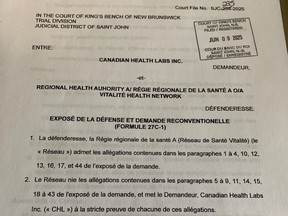Health authority strikes back at travel nurse firm in countersuit

Vitalité Health Network argues in court documents Canadian Health Labs has no case in multimillion-dollar travel nurse controversy

Article content
One of New Brunswick’s regional health authorities is countersuing Canadian Health Labs, the Ontario company that charged big money for travel nurses and personal support workers when the province was struggling to staff hospitals and nursing homes during the coronavirus pandemic.
Advertisement 2
Article content
In documents filed with the Court of King’s Bench in Saint John this week, Vitalité Health Network argued the firm had breached its contracts and therefore had no case in lawsuits filed earlier this year.
Vitalité, which serves about one in three patients in New Brunswick – mostly in francophone communities in the northern and eastern portions of the province – is seeking damages for the alleged contract breaches, punitive or aggravated damages, interest and costs.
None of the allegations have been proven in court.
“CHL’s repeated and systematic failures have seriously compromised the network’s ability to provide safe, effective and continuous health care to the population it serves,” the authority states in French, adding that the firm’s shortcomings “have resulted in significant and unjustified additional expenses constituting an abusive use of public funds.”
Advertisement 3
Article content
The counterclaims state that CHL failed to meet several contractual obligations, of which Vitalité says it informed the company in writing on or around June 30, 2023.
This included complaints that the firm deployed lower-skilled personal support workers instead of licensed practical nurses or registered nurses when required, and did not have enough daily teams to ensure the work would be done properly.
The health network says CHL did not submit “reasonable and justifiable” expenses, such as for lodging and car rentals, and did not charge the right amount for fixed daily allowances. The firm did not charge HST properly, the network says, and failed to disclose conflicts of interest. However, Vitalité did not provide details of those alleged conflicts.
Article content
Advertisement 4
Article content
Furthermore, Vitalité says, the firm didn’t provide enough nurses who spoke French or met other requirements. The regional health authority has a legal obligation under New Brunswick’s Official Languages Act to serve people in English or French, whatever their choice.
The health network acknowledged the company’s claim that it refused to pay part of the contracts, but says this decision “was based on valid and contractually justified grounds, including in particular the lack of sufficient language skills, the lack of compliant professional accreditation, or the failure to comply with prerequisites such as criminal background checks, training certificates or applicable regulatory requirements.”
Advertisement 5
Article content
Additionally, Vitalité argues in its counterclaim the three contracts signed with the firm on Aug. 1, Nov. 6 and Dec. 2, 2022, are null and void because the Holt Liberal government passed a law last week that terminates the agreements and bars the company from suing.
“The network asserts that this action is inadmissible and should be dismissed with costs in its favour,” states the document, filed June 9 by lawyers representing Vitalité: Daniel Surette and Vincent Charest of the firm Bingham Law in Moncton.
Travel nurses in New Brunswick have been under scrutiny since news broke in February 2024 that Vitalité had spent $123 million on hiring outside professionals to replace sick nurses and fill other staffing holes, including more than $98 million on three contracts with Canadian Health Labs.
Advertisement 6
Article content
Blaine Higgs, who was the Progressive Conservative premier at the time, blamed Vitalité management for signing bad contracts. But the CEO of the organization, Dr. France Desrosiers, responded that she had received approval from the Department of Health to sign off on them.
The company charged about $300 an hour on average per nurse. Although comparisons are difficult, because full-time nurses receive pensionable benefits and the like, the $300 an hour is far more than what Vitalité nurses earn.
Registered nurses with the health authority are paid as much as $48 an hour, whereas licensed practical nurses, who have less education, can make as much as $32 an hour.
Vitalité’s first contract, which was in effect from Aug. 1, 2022, to Sept. 30, 2023, was for a maximum of $20 million, according to the documents obtained by the Globe and Mail. That deal saw CHL provide registered nurses and licensed practical nurses at a rate of $300.72 an hour to Vitalité’s 11 hospitals.
Advertisement 7
Article content
The second contract, in effect from Nov. 21, 2022, to May 31, 2024, was capped at $45 million. It was for CHL personal support workers – at a rate of $162.29 an hour – for both Vitalité hospitals and Social Development facilities.
And the third contract, in effect from Dec. 5, 2022, to Feb. 5, 2026, had a maximum of $93 million. It provided nurses at a rate of $306.70 an hour.
Trying to stamp out the controversy, the new Liberal government introduced a bill on March 19 to cancel the contracts and added a provision to protect against lawsuits.

Health Minister John Dornan acknowledged to reporters earlier the law wouldn’t necessarily stop Canadian Health Labs from trying to sue, but that it should ensure the government’s success in stopping any suits in their tracks.
Advertisement 8
Article content
In January, Vitalité told Canadian Health Lab workers at its hospitals to go home. The company responded by launching legal action, alleging multiple breaches of the one contract that wasn’t supposed to expire until next year.
Then, in May, only hours after the provincial government finished explaining the new law it had introduced to sink Canadian Health Lab’s legal actions, the firm filed two more lawsuits. Both also centred around alleged breaches of contract by the health authority.
None of the allegations contained in the three lawsuits have been tested in court.
The firm did not respond to a request from Brunswick News for comment. A spokesperson for Vitalité said the network would not comment because the matter was still before the court.
Advertisement 9
Article content
Auditor General Paul Martin released a report last year about the travel nurse contracts, including deals signed by the Horizon Health Network (the larger of the two regional health authorities), and the Department of Social Development, which oversees nursing homes.
Martin concluded that the contracts posed an “undue risk” to the province, noting there was no evidence of “proper contract development, management or oversight.”
He also flagged that Vitalité had repeatedly refused to hand over three internal audit reports related to a contract with Canadian Health Labs.
Earlier this month, the auditor general lost his legal battle to obtain those audit reports.
In a June 2 decision, Court of King’s Bench Chief Justice Tracey DeWare dismissed Martin’s application for access, stating she wasn’t satisfied that the Auditor General Act explicitly waives solicitor-client or litigation privilege.
– with files from Barbara Simpson and Andrew Waugh
Article content
link








